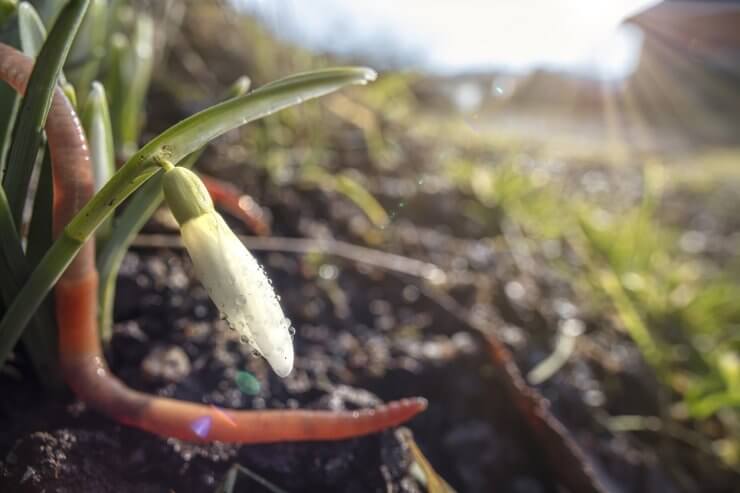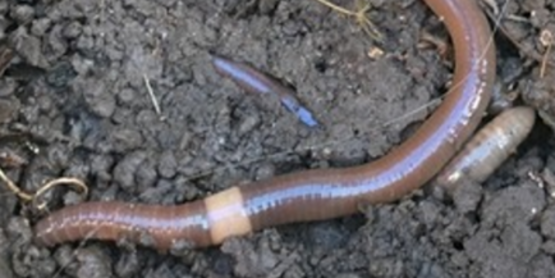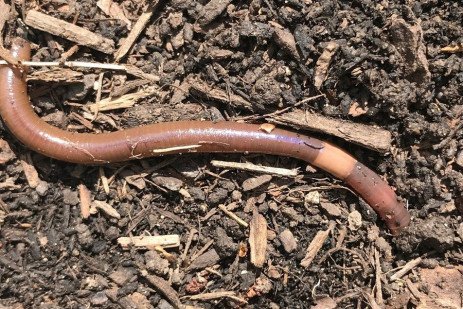
Gardeners love worms. They aerate the soil, provide nutrients that plants need, and help keep the soil healthy. So a garden with lots of worms in the soil is almost guaranteed to be productive and happy. But that’s not true with one species: the Asian Jumping Worm.
Jumping worms, crazy worms, Alabama jumpers, and snake worms are all different names for the Asian jumping worm. At first glance, they look very much like your typical earthworm, but as helpful as earthworms are, jumping worms are equally destructive. And they might be in your garden right now.
Discover 7 top tips for growing, harvesting, and enjoying tomatoes from your home garden—when you access the FREE guide The Best Way to Grow Tomatoes, right now!

Photo of Asian Jumping Worm – Credit: Cornell University
What makes the Asian jumping worm so bad (and what to do about it)
The Asian jumping worm is an invasive species that grows and eats rapidly. They quickly devour detritus and create large amounts of castings. These castings, or worm poop, are usually a highly nutritious addition to your garden soil.
The problem, however, is that, unlike other earthworms, like nightcrawlers, for example, Asian jumping worms stay close to the surface of the soil. As a result, the castings are easily washed away by rain or even wind. Even worse, they often out-compete other worms. So all that deep aeration and nutrient production that generally happens around plant roots is gone.
In effect, these jumping worms actively remove beneficial elements from the soil. Obviously, that’s not ideal.
How can you recognize Asian Jumping Worms?
The first thing to look for is soil that looks like coffee grounds. Then if you dig into the top layer of soil, you may notice “the worms thrashing about with an erratic, snakelike movement,” according to the Cornell University Cooperative Extension. Additionally, these worms look a little different than nightcrawlers. Here’s how the Penn State Extension program describes them:
“If you examine a worm close-up, you will notice the prominent band around the body of the worm called the clitellum, where cocoons are produced. On a jumping worm, the band completely encircles the body, is milky white to light gray, and is flush with the body. On European nightcrawlers, the clitellum is raised and reddish-brown color and does not wrap entirely around the body.”

Photo of Asian Jumping Worm Credit: Penn State
The interesting thing about the Asian jumping worm is that the worm population dies off once temperatures get below freezing. However, the cocoons often survive, resulting in a new infestation in the spring. That gives us gardeners an excellent opportunity to eradicate them.
According to the Penn State Extension Program, these cocoons are sensitive to heat, so solarizing your garden soil in the spring or early summer can eliminate the cocoons. As long as the soil reaches 104 degrees Fahrenheit for three days, you should be in the clear.
Suppose some worms survive? Or you don’t notice an infestation until your garden is already in progress? You still have some options.
If there aren’t many, you can toss them into a bag and then into the trash. There is also some evidence that diatomaceous earth or ground-up charcoal may kill adult jumping worms. Just work it into the soil to the depth where you find the worms.
Have you encountered jumping worms yet? How did you handle it?
Discover 7 top tips for growing, harvesting, and enjoying tomatoes from your home garden—when you access the FREE guide The Best Way to Grow Tomatoes, right now!





Can I set asparagus seedlings in the garden as soon as they are ready for transplanting?
Ooh, starting asparagus from seed, daring! Seedlings need to grow about 12 weeks before they can be transplanted but after that they should be fine to be transplanted into the garden after the last frost. Just know that planting asparagus crowns takes 3 years to harvest so growing from seed will take a couple more and a lot of patience 🙂
I have jumping worms on my property in the Chicago suburbs and I have found them in a relative’s property 10 miles west of me. When I am gardening, I keep a small bucket of white vinegar and drop them in but this is tilting at windmills. They are prolific in my yard but I continue anyway. If I find them when I am without my vinegar bucket, I put them on the driveway and mash them to oblivion so there is no chance of resurrection. I have yet to encounter the hammerhead worm but thank you and Donna C. for alerting me to them.
Are these worms ok for chickens to eat?
The worms aren’t poisonous so it seems they’d be totally fine for chickens!
The Asian Jumping Worms are only part of an evolving problem the I have first hand knowledge of. There is now another type of worm called Bipalium Adventitium. These are highly toxic as they secrete a tetrodotoxin. This is a neurotoxin and it is dangerous to our pets. What is the most dangerous thing about these worms is that they eat earthworms and they have no predator. I have a large population of both and have been working with the New Jersey Invasive Species Strike Team to get the word out. If you see one you need to destroy it. Do Not Cut it, you will only make new worms. These can only be destroyed with direct contact of Salt, Boric Acid, White Vinegar, Fire, or Citrus Oil. Then to be sure they are really dead, because they are almost immortal you must freeze them for at least two days before throwing away. I would love to send you some information so you can do an article on them. Between the Asian Jumping Worms and these Bipalium’s (aka Hammerhead Worms) it spells disaster for the soil we all grow in.
What area do these Asian jumping worms live? Example is northern Wisconsin an area?
I know that they are in Northern New Jersey. Not sure of anywhere else, but I’m sure they are everywhere. Especially in the warmer areas of our country. I try to eradicate the Jumping Worm eggs with my weed burner before they hatch or right after. You can see them when they first hatch as tiny little worms that are very squiggly and can almost dance across the top of the dirt.
I recently signed up to volunteer with the invasive species strike team.